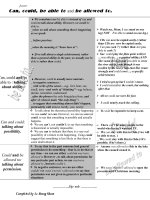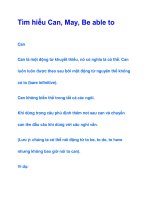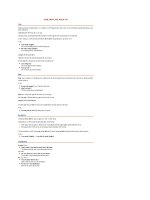English: Can and be able to
Bạn đang xem bản rút gọn của tài liệu. Xem và tải ngay bản đầy đủ của tài liệu tại đây (12.83 KB, 1 trang )
Can and be able to
Both
can
and
be able to
can be used to talk about ability and permission. In some cases, both structures are
possible. However, in some other cases only one of these two structures are used.
She
can knit
. OR She
is able to
knit.
He
can work
on a computer. OR He
is able to work
on a computer.
Of course, in the sentences given below, the structure with
can
sounds more natural and hence is more common.
Here are the rules regarding the correct usage of
can
and
be able to.
You can use ‘can’ or ‘be able to’ to express present or future ability or possibility. Note that in the future tense,
we use
will be able to.
She
can speak
four languages.
He
will be able
to finish it on time.
They
will be able
to come.
I
can come
on Sunday.
I
will be able to
come tomorrow.
Past
To talk about general ability that existed in the past, we can use
could.
She
could
read when she was three.
We
could
go swimming whenever we wanted to.
We do not normally use
could
to say that you were able to do something on one particular occasion. In this case,
was / were able to
is used.
The trains were late but I
was still able to
reach on time. (More natural than ‘The trains were late but I
could still reach on time.’)
We were able to find our way. (NOT We could find our way.)
In the negative, both
could
and
be able to
are possible.
We
couldn’t find
our way. OR We
were not able to find
our way.
Be first to know when grammar rules change! Sign up to our newsletter here: englishgrammar.org (It's free)
Powered by TCPDF (www.tcpdf.org)









